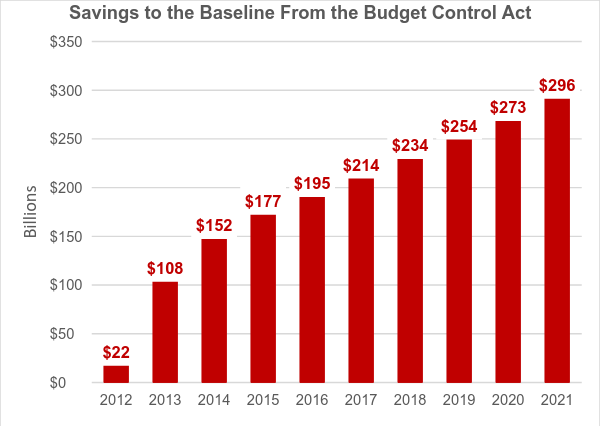In 2011, a Republican House majority, Democratic Senate majority, and a Democratic president passed legislation that is on track to save taxpayers more than $16,000 per household by 2021. But here in 2017, a Republican House majority, Republican Senate majority, and a Republican president threaten to wipe away some of those savings if they succeed in dismantling restraints instituted through the Budget Control Act of 2011 (BCA).
The President’s budget, competing Congressional budget resolutions, and the military reauthorization bill passed by the House, would all exceed the FY 2018 caps on defense, setting up a budget battle down the road. Lawmakers should step back and consider what has been achieved before sweeping away reforms that instituted real, enforceable limits on spending, and lead to total savings of $7,400 per household through 2017. Overtime these will grow, amounting to $16,463 per household by 2021 … if the limits are kept in place.

In 2015, The Congressional Research Service (CRS) sought to ferret out how the BCA reduced the budget baseline as a result of its spending caps and automatic sequestration. Together, the reforms reduced baseline outlays by over $1.6 trillion. Savings from debt interest payments contributes an additional $276 billion to the total, bringing the net savings to over $1.9 trillion.
Along with the gradual economic recovery, and the winding down of the of so-called “stimulus” spending, the BCA was a contributing factor in reducing spending as a share of GDP. Despite Congress watering down the discretionary caps and evading limits on defense spending through Overseas Contingency Operations funding, the BCA nevertheless helped to reset the budget on a lower trajectory. Learn more.
More from NTU Foundation
NTUF’s Andrew Wilford examines how an outdated, protectionist shipping law drives up costs on consumers.
Forward-Thinking States Set the Example for Adoption of Transformative Blockchain Policy
NTUF’s Charles Morris & Ari Boosalis explore how states are advancing – or impeding – the use of blockchain.

